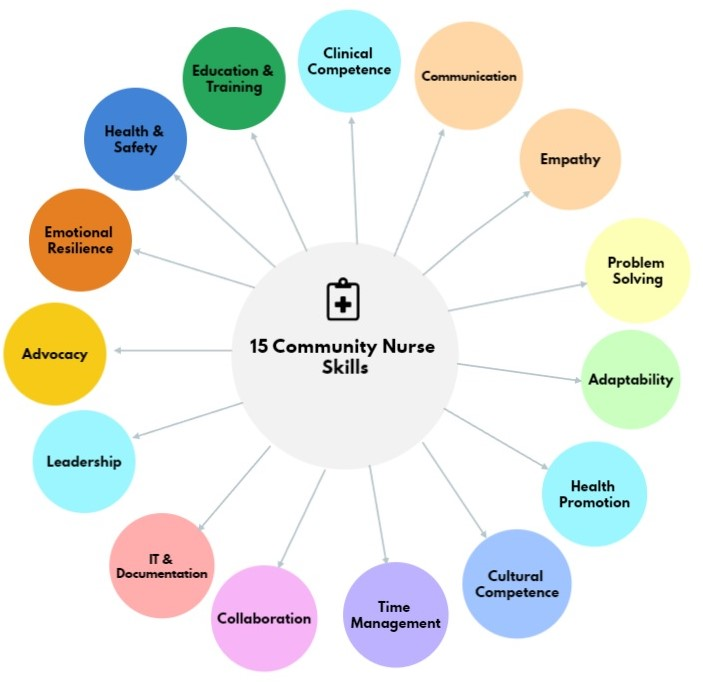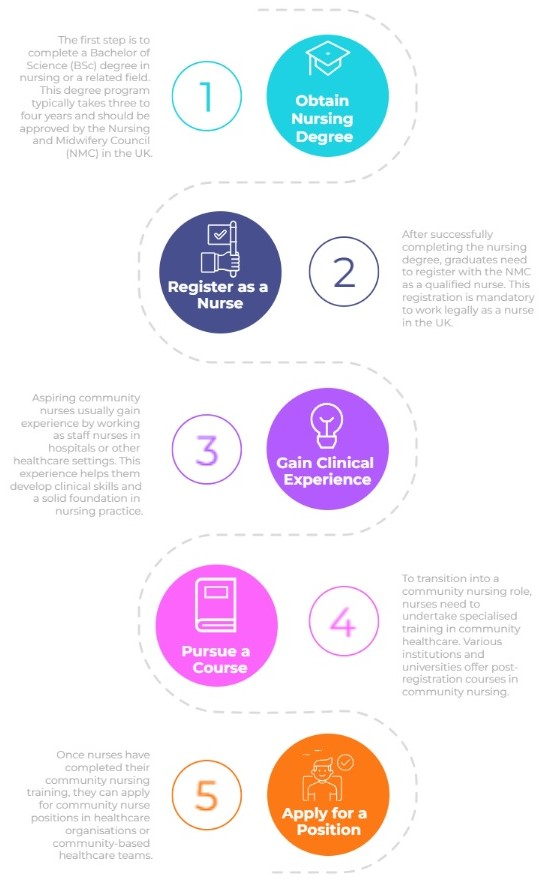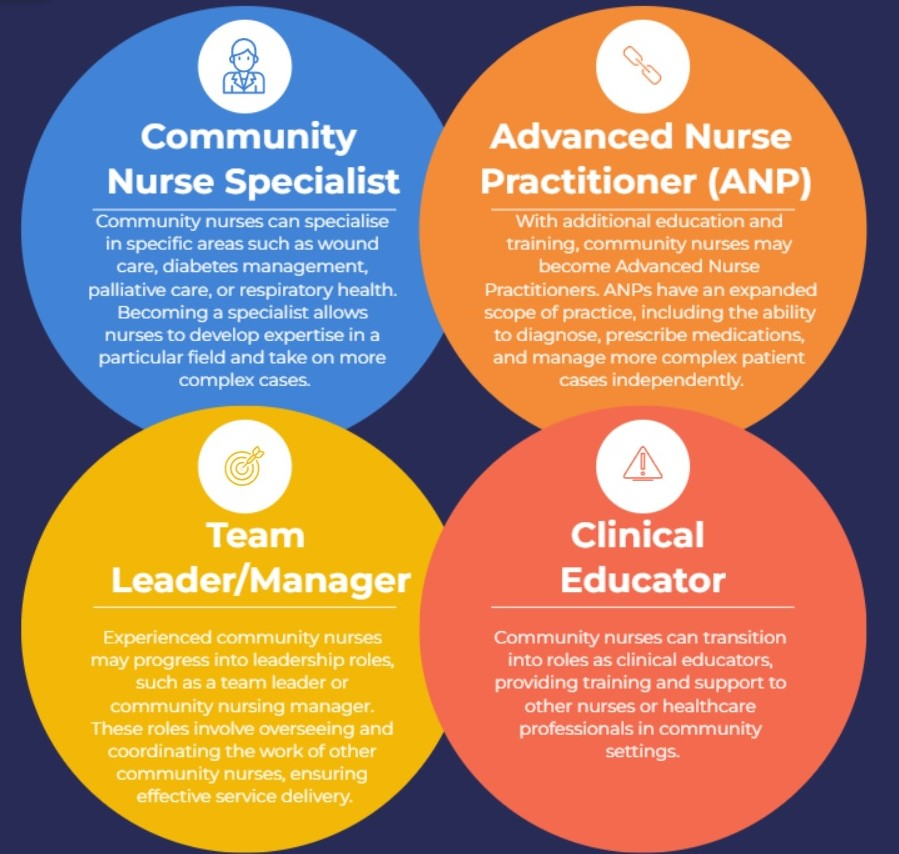
Need more information on community nursing and what it is? Check out this comprehensive guide that covers all aspects of nurses in the community. Learn how you can become a nurse in the UK today!
As a nurse in the UK, you may have heard about community nursing, but may not be entirely sure what it entails. Community nursing is a vital part of healthcare, especially in the current climate. So it’s essential to understand what it is and how it differs from other areas of nursing. In this blog, we’ll explore what community nursing is, the skills and qualifications required, and how it differs from district nursing.
What is a Community Nurse?
Community nurses are healthcare professionals who work in the community with patients in their own homes or in clinics, and other community settings. They provide healthcare, advice, and support to housebound patients who otherwise would have difficulties accessing nursing care in hospitals.
Community nurses play an important role in community nursing teams with other health professionals such as health visitors, general practice nurses, and occupational health nurses.

Day in the Life of a Community Nurse.
As a dedicated community nurse, each day is filled with diverse challenges and rewarding opportunities to provide compassionate nursing care and support to patients in the comfort of their own homes, take a look at someone of the day to day specialities you’ll be involved in:
Home Visits
Conduct regular home visits to patients to assess their health needs, administer treatments, and provide nursing care as prescribed by healthcare professionals.
Wound Management
Specialise in wound care, including assessing, dressing, and managing various types of wounds to promote healing and prevent infections.
Medicines Management
Administer medications as prescribed by doctors and educate patients and their families about proper medication management and potential side effects.
Chronic Disease Management
Provide specialised nursing care to patients with chronic illnesses such as diabetes, heart conditions, respiratory problems, etc., to help manage their conditions and prevent exacerbations.
Palliative Care
Offer compassionate end-of-life nursing care and support to terminally ill patients, providing pain management and emotional assistance to patients and their families.
Health Promotion
Educate individuals and communities on various health issues, disease prevention, and healthy lifestyle choices.
Care Planning
Develop individualised care plans for patients based on their specific healthcare needs and collaborate with other healthcare professionals to ensure coordinated care.
Record Keeping
Maintain accurate and up-to-date patient records, documenting assessments, interventions, and outcomes.
Health Assessments
Conduct comprehensive health assessments, including physical examinations and health histories, to identify patients’ healthcare requirements.
Support for Carers
Provide guidance and support to family members and caregivers involved in the patient’s care.
Infection Control
Follow infection control protocols to prevent the spread of infections during patient care.
Collaborate with Multidisciplinary Team
Work closely with other healthcare professionals, such as doctors, therapists, social workers, and community organisations, to provide holistic care to patients.
Health and Safety
Ensure compliance with health and safety regulations and maintain a safe working environment for both patients and healthcare professionals.

What’s the Difference Between a District Nurse and a Community Nurse?
In the UK, the terms “District Nursing” and “Community Nurse” are often used interchangeably, and the roles share many similarities. However, there are some nuanced differences between the two:
The core difference is that district nurses work to a more extensive remit to provide outreach services and can undertake more complex care, such as taking blood samples and dressing leg ulcers and palliative care. They work in partnership with social services, other agencies, and the hospital and have the critical role in the provision of end-of-life care and regular home visits.
In practice, the key takeaway is that both District Nursing and Community Nurses are skilled professionals who play a crucial role in providing healthcare services within the community. They focus on delivering patient-centred care, health promotion, and disease prevention to individuals in their homes and other community settings. The specific job title and its associated responsibilities may depend on the organisation, local healthcare policies, and the preferences of the healthcare provider.

Community Nurses Skills:
To become a community nurse, you need a huge range of skills, as you’ll be working with different people in different environments. Community nurses should have a good understanding of the following skills to succeed in this career path:
Clinical Competence
A strong foundation of clinical knowledge and skills, including proficiency in wound care, medication administration, health assessments, and other nursing procedures.
Communication Skills
Excellent verbal and written communication skills to effectively interact with patients, their families, and other members of the healthcare team.
Empathy and Compassion
The ability to show empathy and provide compassionate nursing care to patients, especially those who may be vulnerable or facing challenging health conditions.
Problem-Solving
Critical thinking and problem-solving abilities to assess complex patient situations, make clinical decisions, and provide appropriate interventions.
Adaptability
Flexibility to work in diverse community settings, handle varying patient needs, and adjust to changing circumstances.
Time Management
Effective time management skills to prioritise tasks, manage schedules, and ensure timely delivery of care to multiple patients.
Health Promotion
Knowledge and expertise in health promotion and disease prevention to educate patients and communities about healthy lifestyle choices and risk reduction.
Cultural Competence
Awareness and sensitivity to cultural differences to provide culturally competent care and respect patients’ diverse backgrounds and beliefs.
Collaboration
Strong teamwork and collaboration skills to work with other healthcare professionals, social services, and community organisations to provide holistic care to patients.
IT and Documentation
Proficiency in using healthcare information technology systems for documentation, record-keeping, and accessing relevant patient information.
Leadership
Leadership skills to take charge of patient care, coordinate care plans, and act as a resource for other healthcare members in small teams.
Advocacy
Ability to advocate for patients’ needs, ensuring they receive the appropriate support and resources for their healthcare requirements.
Emotional Resilience
Resilience to cope with emotionally challenging situations and maintain a positive and caring demeanour while facing various patient scenarios.
Health and Safety
Knowledge of health and safety regulations to ensure a safe environment for both patients and healthcare professionals.
Education and Training
Willingness to engage in continuous professional development, staying updated with the latest healthcare practices and participating in relevant training opportunities.

Qualifications Needed for Community Nursing:
To become a community nurse in the UK, a registered nurse must undergo additional training and gain relevant experience in community healthcare settings. Here are the general steps, entry requirements and qualifications required to become a community nurse:
Obtain a Nursing Degree
The first step is to complete a Bachelor of Science (BSc) degree in nursing or a related field. This degree program typically takes three to four years and should be approved by the Nursing and Midwifery Council (NMC) in the UK.
Register as a Nurse
After successfully completing the nursing degree, graduates need to register with the NMC as a qualified nurse. This registration is mandatory to work legally as a nurse in the UK.
Gain Clinical Experience
Aspiring community nurses usually gain experience by working as staff nurses in hospitals or other healthcare settings. This experience helps them develop clinical skills and a solid foundation in nursing practice.
Pursue a Community Nursing Course
To transition into a community nursing role, nurses need to undertake specialised training in community healthcare. Various institutions and universities offer post-registration courses in community nursing.
Apply for a Community Nursing Position
Once nurses have completed their community nursing training, they can apply for community nurse positions in healthcare organisations or community-based healthcare teams.

Advantages and Disadvantages of Community Nursing:
Advantages of Community Nursing:
Community nursing offers several advantages as a career path for registered nurses. It provides unique opportunities for professional growth, job satisfaction, and the chance to make a positive impact on patients and communities. Here are some of the advantages of pursuing a career in community nursing:
Meaningful Patient Relationships
Community nurses often work closely with patients and their families over an extended period. This allows them to build strong and meaningful relationships, providing personalised care and emotional support to individuals in their homes and communities.
Patient-Centred Care
Community nursing places a strong emphasis on patient-centered care. Nurses have the opportunity to tailor their services to meet the specific needs of each patient, focusing on holistic care and promoting well-being.
Diverse Work Settings
Community nurses work in a variety of settings, including patients’ homes, schools, community clinics, and provide outreach services. This diversity offers a dynamic and ever-changing work environment.
Autonomy and Independence
Community nurses often work autonomously, making independent decisions about patient care and managing their schedules. This autonomy allows for a sense of ownership and responsibility in delivering care.
Health Promotion and Prevention
Community nursing involves a strong focus on health promotion, disease prevention, and educating patients and communities about healthy lifestyles. Nurses play a key role in empowering individuals to take control of their health.
Flexibility in Working Hours
Community nursing may offer more flexible working hours compared to traditional hospital settings, allowing nurses to better balance their work and personal lives.
Professional Development
As community nursing requires specialised training and skills, it offers opportunities for professional development and career advancement through post-registration courses and further education.
Collaborative Teamwork
Community nurses work closely with multidisciplinary teams, including doctors, therapists, social workers, and community organisations. Collaborative teamwork enhances the quality of patient care and encourages learning from other healthcare professionals.
Personal Fulfilment
Community nurses often find their work deeply rewarding, knowing that they are making a positive impact on patients’ lives and supporting them in times of need.
Varied Patient Cases
Community nursing exposes nurses to a diverse range of patient cases, health conditions, and challenges, providing continuous learning and professional growth.
Community Integration
Community nurses become an integral part of the local community, gaining a deeper understanding of the community’s health needs and the social determinants of health.
Innovation and Creativity
In community nursing, nurses often face unique situations that require creative problem-solving and innovative approaches to care delivery.

Disadvantages of Community Nursing:
While community nursing offers many rewarding aspects, like any career, it also comes with its own set of challenges and disadvantages. Here are some of the disadvantages of pursuing a career in community nursing:
Travel and Commute
Community nurses often have to travel extensively to visit patients in their homes and community settings. This can lead to long commute times and increased expenses, especially in rural areas with dispersed populations.
Workload and Time Constraints
Community nurses may face a high workload due to managing multiple patients and their diverse healthcare needs. Balancing patient care, paperwork, and administrative tasks can be demanding, potentially leading to time constraints and stress.
Limited Resources
Community healthcare settings may have limited resources compared to larger hospitals. This could impact the availability of medical supplies, technology, and support services.
Isolation
Working in the community, especially during home visits, can sometimes be isolating for nurses, as they may have limited direct interaction with colleagues compared to hospital-based roles.
Safety Concerns
Community nurses may encounter potentially unsafe environments during home visits, such as homes with hazards or areas with higher crime rates. Ensuring personal safety is crucial but can still be a concern.
Emotional Strain
Providing care in patients’ homes and witnessing the challenges they face can be emotionally taxing for community nurses, particularly when caring for patients with terminal illnesses or complex care needs.
Lack of Immediate Support
Unlike hospital admissions, where immediate support is often readily available, community nurses may face challenges in accessing help or resources in urgent situations.
Inconsistent Schedules
Community nursing schedules may be irregular, with the need to work evenings, weekends, and on-call shifts to accommodate patients’ needs.
Administrative Burden
Community nurses are often responsible for extensive documentation and paperwork, which can be time-consuming and divert attention from direct patient care.
Limited Career Advancement
In some cases, community nursing may have fewer opportunities for career advancement compared to larger healthcare institutions with more specialised roles.
Burnout and Job Satisfaction
The demanding nature of community nursing, coupled with the emotional challenges, workload, and limited resources, can contribute to burnout and impact job satisfaction.
Lack of Recognition
Community nursing may not always receive the same level of recognition and appreciation as hospital-based roles, despite the essential role they play in the healthcare system.

Community Nursing Salary Expectations:
The salary for theatre nurses in the UK can vary depending on factors such as location, experience, and the specific healthcare organisation. It’s important to note that salary scales and rates are subject to change over time and may differ across regions.
Staff Community Nurse Average Salary:
The salary range for Community Nurses in the UK typically starts around £35,000 per year. However, depending on factors such as experience, location, and additional responsibilities, the salary can go up to approximately £50,000.

Agency Community Nurse Average Salary:
Agency Community Nurses in the UK could expect to earn an hourly rate typically ranging from £25 to £35 translating to £45,000 to £65,000 providing you work full time hours.

Community Nursing Career Prospects?
Community nursing offers several career prospects and opportunities for advancement within the healthcare system. While the specific career trajectory may vary depending on individual preferences, qualifications, and the organisation, here are some common career prospects for community nurses:
Community Nurse Specialist
Community nurses can specialise in specific areas such as wound care, diabetes management, palliative care, or respiratory health. Becoming a specialist allows nurses to develop expertise in a particular field and take on more complex cases.
Advanced Nurse Practitioner (ANP)
With additional education and training, community nurses may become Advanced Nurse Practitioners. ANPs have an expanded scope of practice, including the ability to diagnose, prescribe medications, and manage more complex patient cases independently.
Team Leader/Manager
Experienced community nurses may progress into leadership roles, such as a team leader or community nursing manager. These roles involve overseeing and coordinating the work of other community nurses, ensuring effective service delivery.
Clinical Educator
Community nurses can transition into roles as clinical educators, providing training and support to other nurses or healthcare professionals in community settings.

Related Topics:
Become a Theatre Nurse – All You Need to Know & Theatre Nursing Job Openings | CVLocum
What is a General Practice Nurse? Description, Salary & Job Roles | CVLocum
Become an ANP Nurse – All You Need to Know & Job Openings | CVLocum
Conclusion
Community nursing is an area of nursing that plays a vital role in providing high-quality care to patients in their own homes. As a community nurse, you’ll work with a wide range of patients in different environments, from secure homes to outreach services. You’ll also work with other health professionals to provide excellent care to patients who are unable to access hospital care. If you’re interested in pursuing a career in community nursing, you must obtain the necessary qualifications and skills required.

Community Nursing Job Roles.
If you are a registered nurse looking to take your career to the next level? CVlocum’s jobs board is an excellent resource for finding Community Nursing Roles and other various community nursing services that align with your aspirations. With its extensive database of healthcare vacancies, CVlocums offers a diverse range of opportunities to explore.
Alternatively, take a look at our user-friendly platform below:

